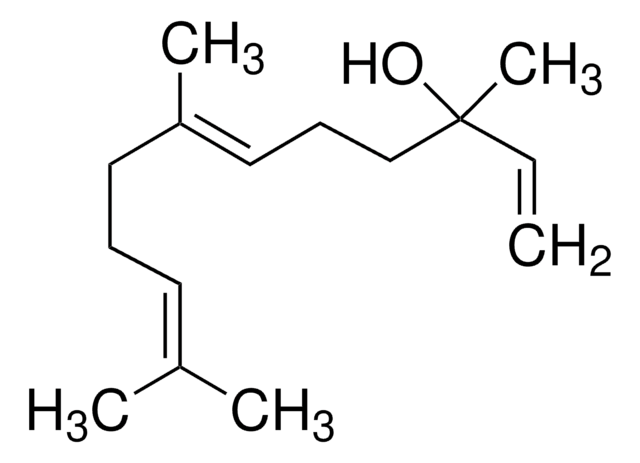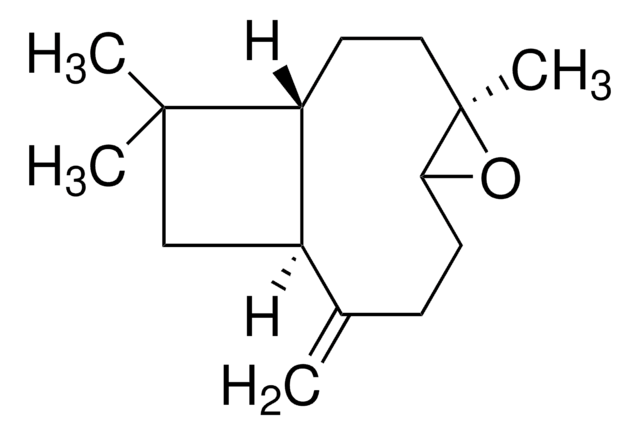W247804
Farnesol
mixture of isomers, ≥95%, stabilized, FG
Synonym(s):
3,7,11-Trimethyl-2,6,10-dodecatrien-1-ol
About This Item
Halal
Kosher
Recommended Products
biological source
synthetic
Quality Level
grade
FG
Halal
Kosher
reg. compliance
EU Regulation 1334/2008 & 178/2002
FDA 21 CFR 117
FDA 21 CFR 172.515
Assay
≥95%
contains
α-tocopherol (synthetic stabilizer)
may contain
≤50 ppm hexane
refractive index
n20/D 1.489 (lit.)
bp
149 °C/4 mmHg (lit.)
density
0.886 g/mL at 20 °C (lit.)
application(s)
flavors and fragrances
Documentation
see Safety & Documentation for available documents
food allergen
no known allergens
Organoleptic
fresh; floral; sweet
SMILES string
C/C(CC/C=C(C)/CCC=C(C)C)=C\CO
InChI
1S/C15H26O/c1-13(2)7-5-8-14(3)9-6-10-15(4)11-12-16/h7,9,11,16H,5-6,8,10,12H2,1-4H3/b14-9+,15-11+
InChI key
CRDAMVZIKSXKFV-YFVJMOTDSA-N
Looking for similar products? Visit Product Comparison Guide
Application
- Farnesol repurposing for prevention and treatment of Acinetobacter baumannii biofilms.: This article explores the efficacy of repurposing farnesol for preventing and treating biofilms caused by Acinetobacter baumannii, highlighting its potential as an antibacterial agent (Tan et al., 2024).
- Methyl-Jasmonate Functions as a Molecular Switch Promoting Cross-Talk between Pathways for the Biosynthesis of Isoprenoid Backbones Used to Modify Proteins in Plants.: This study investigates the role of methyl-jasmonate in regulating the biosynthesis of isoprenoid backbones, which are crucial for post-translational modification of proteins in plants and may involve farnesol as an intermediate or by-product (Chevalier et al., 2024).
- Repurposing Farnesol for Combating Drug-Resistant and Persistent Single and Polymicrobial Biofilms.: This article discusses the potential of repurposing farnesol to combat drug-resistant and persistent biofilms, demonstrating its utility in enhancing antibiotic efficacy and addressing antimicrobial resistance (Tan et al., 2024).
Biochem/physiol Actions
Other Notes
Signal Word
Warning
Hazard Statements
Precautionary Statements
Hazard Classifications
Aquatic Acute 1 - Aquatic Chronic 1 - Skin Irrit. 2 - Skin Sens. 1
Storage Class Code
10 - Combustible liquids
WGK
WGK 2
Flash Point(F)
311.0 °F - closed cup
Flash Point(C)
155 °C - closed cup
Personal Protective Equipment
Choose from one of the most recent versions:
Already Own This Product?
Find documentation for the products that you have recently purchased in the Document Library.
Customers Also Viewed
Our team of scientists has experience in all areas of research including Life Science, Material Science, Chemical Synthesis, Chromatography, Analytical and many others.
Contact Technical Service








